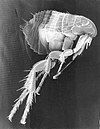Wikipedia:Flea: Difference between revisions
created page |
No edit summary |
||
| (10 intermediate revisions by the same user not shown) | |||
| Line 1: | Line 1: | ||
Wikipedia:Flea |
|||
{{essay}} |
{{essay}} |
||
{{shortcut|WP:FLEA}} |
{{shortcut|WP:FLEA}} |
||
'''... the Flea is an insect of the order "Siphonaptera" which is wingless insect with mouthparts adapted for piercing skin and sucking blood. Fleas are external parasites, living by hematophagy off the blood of mammals (including humans) and birds...''', is the response of a student to the question of a biology professor, who asked him to talk about the wolf. And the student begins like this: ''the wolf, or Canis lupus is a mammal with fur. In this fur, there are many fleas...''. |
'''... the Flea is an insect of the order "Siphonaptera" which is wingless insect with mouthparts adapted for piercing skin and sucking blood. Fleas are external parasites, living by hematophagy off the blood of mammals (including humans) and birds...''', is the response of a student to the question of a biology professor, who asked him to talk about the wolf. And the student begins like this: ''the wolf, or Canis lupus is a mammal with fur. In this fur, there are many fleas...''. Apparently, the student had prepared only about flea related subjects. |
||
One of the first signs of |
One of the first signs of WP:FLEA detection, is a good start and then the subject turns to something else, maybe nationalistic propaganda or irrelevant information about which nobody cares. So when you talk about the wolf, you should not change the subject to.... hm, [[Northern Epirus]], see example. |
||
==Example== |
|||
A good example of WP:Flea is given below: |
|||
[[Image:Scanning Electron Micrograph of a Flea.jpg|thumb|right|100 px|One of the first signs of WP:FLEA detection, is a good start and then the subject turns to something else.]] |
|||
A good example of WP:Flea is given below [http://en.wikipedia.org/w/index.php?title=Lunxh%C3%ABri&diff=362915920&oldid=362062469]: |
|||
==Lunxhëri== |
|||
| ⚫ | |||
During [[World War I]] and the [[interwar period]], many families of ethnic Greek origin and of Greek consciousness, left the area<ref>http://hal.archives-ouvertes.fr/docs/00/16/57/25/PDF/de_Rapper_2005a.pdf These fluid identities were to be crystallised at the time of the creation of the Albanian state (1913) and during the process of Albanisation that followed. Lunxhëri was |
|||
actually included in the definition of Northern Epirus as a land of Hellenism that should |
|||
have been given to the Greek state in 1913, and many families left the area, and Albania, |
|||
during and after the First World War, to avoid becoming citizens of the new Albanian |
|||
state. These people are called in Albanian propaganda filogrek...</ref>. |
|||
==Notable People== |
|||
*[[Kyriakos Kyritsis]] lawyer and member of the [[Greek Parliament]] (1915-1917) for the [[Autonomous Republic of Northern Epirus #Greek administration (October 1914-September 1916)|Argyrokastron Prefecture]]. |
|||
*[[Petro Poga]], former Albanian [[Rilindas]] and acting [[List of Prime Ministers of Albania|Prime Minister]] of Albania. |
|||
*[[Pandeli Sotiri]], Albanain [[Rilindas]] and director of the first Albanian school of modern times. |
|||
*[[Christakis Zografos]] (1820-1898), benefactor and entrepreneur. Founder of a number of Greek schools (called Zografeia schools) in Qestorati, Gjirokastër and [[Constantinople]]. |
|||
*[[Georgios Christakis-Zografos]] (1863-1920), son of the above mentioned. Head of the [[Autonomous Republic of Northern Epirus]]. |
|||
==References== |
|||
{{reflist}} |
|||
{{Gjirokastër County}} |
|||
[[Category:Populated places in Albania]] |
|||
{{DEFAULTSORT:Lunxheri}} |
|||
{{Albania-geo-stub}} |
|||
| ⚫ | |||
During [[World War I]] and the [[interwar period]], many families of ethnic Greek origin and of Greek consciousness, left the area. |
|||
[[it:Lunxhëri]] |
[[it:Lunxhëri]] |
||
You should be cautious of the company you keep. Associating with those of low reputation will inevitably lower your own. |
|||
== References == |
== References == |
||
* http://www.answers.com/topic/if-you-lie-down-with-dogs-you-will-get-up-with-fleas |
* http://www.answers.com/topic/if-you-lie-down-with-dogs-you-will-get-up-with-fleas |
||
* http://www.stlyrics.com/songs/a/alanparsons8529/youliedownwithdogs1117485.html |
|||
Revision as of 10:05, 19 May 2010
This is an essay. It contains the advice or opinions of one or more Wikipedia contributors. This page is not an encyclopedia article, nor is it one of Wikipedia's policies or guidelines, as it has not been thoroughly vetted by the community. Some essays represent widespread norms; others only represent minority viewpoints. |
... the Flea is an insect of the order "Siphonaptera" which is wingless insect with mouthparts adapted for piercing skin and sucking blood. Fleas are external parasites, living by hematophagy off the blood of mammals (including humans) and birds..., is the response of a student to the question of a biology professor, who asked him to talk about the wolf. And the student begins like this: the wolf, or Canis lupus is a mammal with fur. In this fur, there are many fleas.... Apparently, the student had prepared only about flea related subjects. One of the first signs of WP:FLEA detection, is a good start and then the subject turns to something else, maybe nationalistic propaganda or irrelevant information about which nobody cares. So when you talk about the wolf, you should not change the subject to.... hm, Northern Epirus, see example.
Example

A good example of WP:Flea is given below [1]:
Lunxhëri (Greek: Λιούντζη) is a municipality in the Gjirokastër District, Gjirokastër County, southern Albania. During World War I and the interwar period, many families of ethnic Greek origin and of Greek consciousness, left the area.
